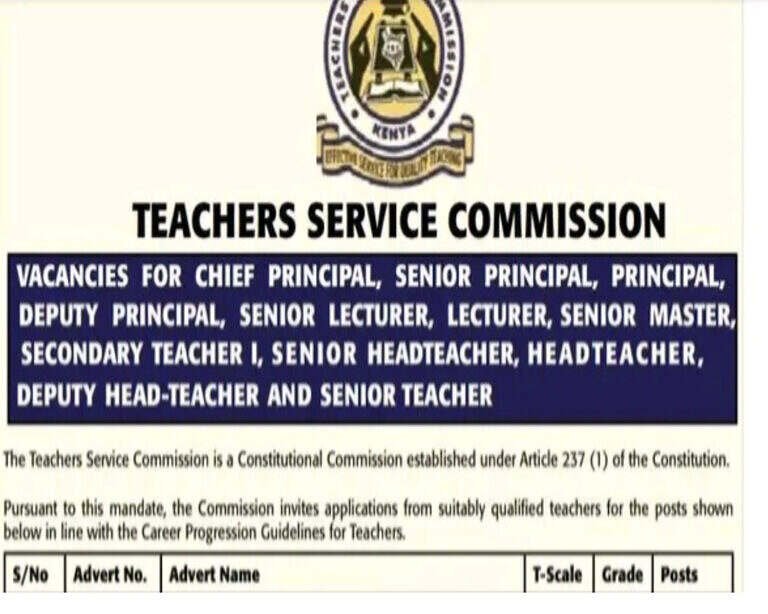
In Kenya, the Special Needs Education (SNE) sector has become an area of critical focus within the education system. However, the recruitment of qualified teachers to fill positions in special needs schools has proven to be a persistent challenge. Despite efforts to address this, the Teacher Service Commission (TSC) has seen alarmingly low application rates for these roles, particularly in rural and underserved areas. To bridge this gap, the TSC is not only raising awareness about the importance of special education but also making adjustments to attract more teachers to this vital sector.
Reasons Behind the Low Application Rates
There are several factors contributing to the low number of teachers applying for positions in special needs education. One of the primary reasons is the specific skills and qualifications required to teach students with diverse learning needs. Special education teachers need to be well-versed in various learning disabilities, behavioral challenges, and therapeutic techniques, which often require additional training beyond standard teaching qualifications. Many teachers are deterred by the prospect of these added requirements or feel they lack the necessary training to succeed in such a specialized field.
Moreover, the emotional and physical demands of teaching students with special needs can be overwhelming. Teachers in these roles often work with children who require tailored instruction and extra attention, which can be both rewarding but also exhausting. The challenges of managing students with a wide range of disabilities, including autism spectrum disorder, cerebral palsy, and hearing or visual impairments, can lead to teacher burnout if adequate support and resources are not in place.
Another challenge is the perception that working in special education is less prestigious than teaching in regular schools. In many communities, there is still a lack of awareness about the importance of special needs education, which can make it harder to attract teachers to these roles. Additionally, the financial incentives for teaching in special schools may not always seem commensurate with the extra effort required, further discouraging potential applicants.
The Importance of Special Needs Education in Kenya
Despite these challenges, the importance of special needs education cannot be overstated. In Kenya, the government has committed to inclusive education, ensuring that children with disabilities have equal access to learning opportunities. This is in line with the global commitment to the United Nations’ Sustainable Development Goal 4, which calls for inclusive and equitable quality education for all.
Special needs education is essential for empowering children with disabilities, providing them with the skills and confidence to lead fulfilling, independent lives. Without qualified and dedicated teachers, many students in special needs schools are at risk of being left behind. These students require not only academic support but also emotional guidance, social skills development, and therapies to help them overcome the challenges they face.
In Kenya, the government has been making strides to improve the infrastructure and resources available to special education schools. However, the success of these efforts depends largely on the availability of skilled and compassionate teachers who are willing to dedicate themselves to this noble cause.
How TSC is Adjusting Requirements to Encourage More Applicants
Recognizing the shortage of teachers in this critical field, the TSC has introduced several measures aimed at encouraging more applicants for special needs education positions. One of the main strategies is adjusting the qualifications and requirements for teaching positions in special education. In the past, these roles may have required specialized degrees in special education. However, the TSC is now more flexible in considering teachers with a broader range of backgrounds, including those with additional certifications or relevant experience in working with children with disabilities.
In addition, the TSC is offering targeted professional development programs and training for teachers who want to transition into special needs education. These programs equip teachers with the skills and knowledge necessary to handle the unique challenges of working in this field. The TSC has also been working with universities and colleges to expand training opportunities, ensuring that more teachers can access the education they need to excel in special education roles.
Furthermore, the commission is offering incentives to attract and retain teachers in special needs schools. These include financial incentives, improved working conditions, and greater opportunities for career advancement. The TSC has also emphasized the importance of providing support networks for teachers in special education, including mentorship programs and access to counselors or social workers who can assist in managing the emotional and psychological challenges of the job.
A Call to Action: Explore the Benefits of Special Education Roles
For teachers who are passionate about making a difference in the lives of children with disabilities, special education offers an incredibly rewarding career path. It is a chance to work in a dynamic and supportive environment where teachers have the opportunity to transform lives, help students develop essential skills, and be part of a broader movement towards inclusivity in education.
Teachers who are interested in joining the special education sector are encouraged to take advantage of the resources and support that the TSC and other organizations offer. Whether you’re an experienced educator or a teacher looking to transition into special needs education, there are numerous opportunities to receive training, gain valuable experience, and receive the support necessary to succeed.
If you are ready to make a lasting impact, consider exploring the numerous benefits and opportunities available in special needs education. The future of Kenya’s inclusive education system depends on dedicated teachers like you.
For more information on how you can become involved in special education, visit the TSC website or contact your local education office to learn more about available training programs and job opportunities.
By addressing the current challenges and offering solutions, the TSC is actively working to strengthen the special needs education sector in Kenya, creating a future where all students—regardless of their abilities—can reach their full potential.




